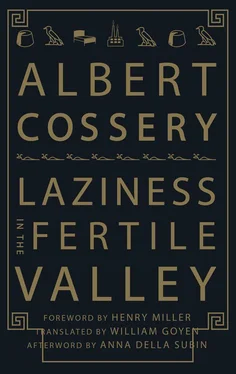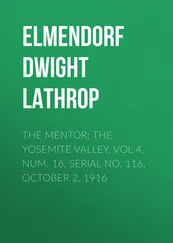Albert Cossery - Laziness in the Fertile Valley
Здесь есть возможность читать онлайн «Albert Cossery - Laziness in the Fertile Valley» весь текст электронной книги совершенно бесплатно (целиком полную версию без сокращений). В некоторых случаях можно слушать аудио, скачать через торрент в формате fb2 и присутствует краткое содержание. Год выпуска: 2013, Издательство: New Directions Publishing Corporation, Жанр: Современная проза, на английском языке. Описание произведения, (предисловие) а так же отзывы посетителей доступны на портале библиотеки ЛибКат.
- Название:Laziness in the Fertile Valley
- Автор:
- Издательство:New Directions Publishing Corporation
- Жанр:
- Год:2013
- ISBN:нет данных
- Рейтинг книги:3 / 5. Голосов: 1
-
Избранное:Добавить в избранное
- Отзывы:
-
Ваша оценка:
- 60
- 1
- 2
- 3
- 4
- 5
Laziness in the Fertile Valley: краткое содержание, описание и аннотация
Предлагаем к чтению аннотацию, описание, краткое содержание или предисловие (зависит от того, что написал сам автор книги «Laziness in the Fertile Valley»). Если вы не нашли необходимую информацию о книге — напишите в комментариях, мы постараемся отыскать её.
Laziness in the Fertile Valley — читать онлайн бесплатно полную книгу (весь текст) целиком
Ниже представлен текст книги, разбитый по страницам. Система сохранения места последней прочитанной страницы, позволяет с удобством читать онлайн бесплатно книгу «Laziness in the Fertile Valley», без необходимости каждый раз заново искать на чём Вы остановились. Поставьте закладку, и сможете в любой момент перейти на страницу, на которой закончили чтение.
Интервал:
Закладка:
If he had little American readership, Cossery had even less of an Egyptian one. On a rare visit to Cairo in the nineties, his dogged Arabic translator Mahmud Qassim — who translated and published four of Cossery’s novels — insisted on “a meeting of two monuments.” He dragged Cossery to meet Naguib Mahfouz. The Nobel Laureate had no idea who he was. Although Cossery claimed to have always carried Egypt inside him, to Egyptians — those who knew of him — he had deserted it. As Qassim said in an interview, “They don’t forgive him for having abandoned Arabic and emigrated to another language.” Worse, the other language was French, the purview of a marginalized elite. Like a dreamer in a cave, Cossery had missed the revolution of 1952, which had branded French, once the language of bourgeois aspirations, as aristocratic and elitist. Moreover, Cossery admitted that after years in Paris, he had forgotten much of his Arabic. Beyond the language barrier, his celebration of laziness and his romanticization of Egypt’s lowlife held little resonance for a readership actively trying to live in, and improve, the country, while often locked in battle against the state. While fellow writers such as Ahmed Fouad Negm and Abd al-Hakim Qasim were thrown in prison, or forced into exile like Jabès and Henein, Cossery sat idly at the Flore.
At the beginning of Cossery’s 1975 novel A Splendid Conspiracy , Teymour, recently returned to Egypt with a fake engineering diploma bought after years of “studying” in Europe, sits dejectedly at a café newly renamed “The Awakening.” He contemplates a statue in the center of the nearby square. Known as The Awakening of the Nation , it depicts a peasant woman with arms outstretched, “as if to denounce the torpor of the residents.” In the scene, Cossery conjures the Nahdat Misr , the granite sculpture of “The Awakening of Egypt” that still stands near Cairo’s Giza Zoo. Completed in 1928 by the renowned sculptor Mahmud Mukhtar, it portrays a peasant throwing back her veil and rousing a sleeping sphinx. The two symbols, of a storied past and a vital present, face east to a new dawn. The sculpture commemorated the events of 1919, when hundreds of thousands of Egyptians across the country — students, peasants, civil servants, and the elite — had joined together in civil disobedience to reject the British occupation. Cossery was nine when the nation gained nominal independence in 1922. Everywhere it was said that, having fallen behind the times, Egypt, and the greater Arab world, was at last awakening — or must awake — from its long slumber into modernity. It was this obsession with the awakening that Tawfiq al-Hakim, a writer Cossery much admired, chose to play upon by reanimating the three-hundred-year-old sleepers from the Quran.
The awakening had at times seemed alloyed with the residue of a strange dream. To transform it into a profit-generating subsidiary of the Empire, the British had introduced new technologies to Egypt such as the railway, the telegraph, and electrical networks. In the early years of the development of the railway, until a steady supply of coal was secured, Egyptian trains, as well as Nile steamers, were occasionally fueled by the mummies frequently unearthed in the valleys. The embalming potions, it turned out, made for first-rate burning materials. A medical journal in 1859 reported: “It is a curious fact that the bodies of the most enlightened nation in its time, many years ago, are now made to aid in getting up steam in the present fast age.” Mark Twain, on his trip to Egypt, joked, “Sometimes one hears the profane engineer call out pettishly, ‘D-n these plebeians, they don’t burn worth a cent — pass out a King!’” The past, no longer able to rest in peace, collided with the effort to modernize.
The stereotype of Oriental indolence, which Cossery pushes to the absurd in Laziness in the Fertile Valley, was built into the very infrastructure of modernity itself. According to Egypt’s retired colonial governor Lord Cromer in 1908, the typical Egyptian was “devoid of energy and initiative, stagnant in mind, wanting in curiosity about matters which are new to him, careless of waste of time, and patient under suffering.” Egyptian laziness, in turn, determined railway timetables and management structures, and became a durable component of the system. It was thought that the Orient did not require the same standards of efficiency or reliability as the Occident, and so a different approximation of punctuality was enforced for British and Egyptian trains. As “Arab time” became institutionalized, the stereotype of idleness became a self-fulfilling prophecy: Egyptians would languish for hours in stations waiting for the capricious train.
If the trains reified laziness, it was the arrival of electricity that gave a jolt to the spirit. For some, electricity took the possibility of an “awakening” out of the realm of metaphor and into that of hard science, as it was understood at the time. In 1905, as discoveries were being made in the field of electromagnetism by Einstein and others, the journal Al-Sahafa ran an article on the phenomenon of tanwim magnatisi (“magnetic sleep inducement”), and the ways in which the electromagnetic current accounts for different flows of energy between the earth and the celestial bodies, and inside the human body and mind. It was followed by an article, “Are We Alive or Dead?” which argued that Egypt was still under a global electromagnetically induced sleep, from which the West had been the first to awaken. Alert, the West had come to oppress the East. The writer then wondered when Egypt would rise from its own trance. During the rebellious months of 1919, riots targeted the electric streetlights, that technology which tames the night and ruins sleep. The British had constantly pointed to the technological advances they had introduced to Egypt as benefits of colonial rule. As streets fell into darkness, artificial illumination became a political symbol. Streetlamps were guarded by the police.
With the rousing of the nation had come the introduction, not unanimously welcomed, of the clock. (Perversely, though God Himself has idled ever since His six days’ work, the first mechanical clocks were used by 14th-century Benedictine monks hoping to keep their prayers on a rigorous schedule.) In 1830, Muhammad Ali Pasha, the Khedive of Egypt, gave France the majestic obelisk that now stands in the Place de la Concorde in exchange for a clock, which some say never even worked. During the occupation, British Time was introduced into Egypt, with Egyptian “slave clocks” taking their orders from the Greenwich observatory. For Egypt to be profitable, it was essential that it function on a synchronized schedule. In the 1870s, the British began to impose the shift from the age-old lunar Hijri calendar to the solar Gregorian calendar. ( It’s April 45th , declared an advertisement, selling a wall calendar, in one Cairo newspaper.) Yet even after the confusion subsided, Egyptians could never fully accept the imposition of European timekeeping. Clock time was not neutral, or apolitical, or natural, as it might have seemed to a Parisian glancing at his watch. The memory of the lunar calendar, something traditional, authentic, and now lost, inflamed the nationalist spirit.
Although it had been introduced in order to further imperialist aims, the fixation on clock-time soon led to a popular obsession with “the value of time.” Articles began appearing in the press that gently admonished the lazy Egyptian to “remember that time is money.” Hassan al-Banna, the son of a watchmaker and the founder of the Muslim Brotherhood, took issue with this equation, writing in a letter from the 1920s that time is even more precious than gold. Religious clerics made efforts to embed punctuality into the system of Islamic ethics. Though the railroads literally ran on laziness, managers introduced harsh penalties for its workers’ indolence: half a day’s wages would be withheld for five minutes’ lateness to work. In Fagalla, catty neighbors gossiped about the Cossery family’s idleness.
Читать дальшеИнтервал:
Закладка:
Похожие книги на «Laziness in the Fertile Valley»
Представляем Вашему вниманию похожие книги на «Laziness in the Fertile Valley» списком для выбора. Мы отобрали схожую по названию и смыслу литературу в надежде предоставить читателям больше вариантов отыскать новые, интересные, ещё непрочитанные произведения.
Обсуждение, отзывы о книге «Laziness in the Fertile Valley» и просто собственные мнения читателей. Оставьте ваши комментарии, напишите, что Вы думаете о произведении, его смысле или главных героях. Укажите что конкретно понравилось, а что нет, и почему Вы так считаете.












